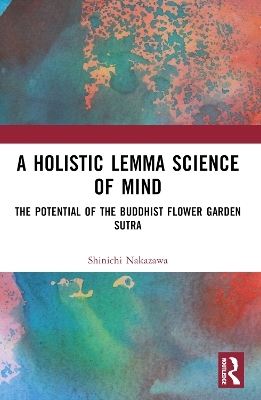
A Holistic Lemma Science of Mind
The Potential of the Buddhist Flower Garden Sutra
Seiten
2024
Routledge (Verlag)
978-1-032-12600-5 (ISBN)
Routledge (Verlag)
978-1-032-12600-5 (ISBN)
Nakazawa connects Buddhist philosophy with modern sciences such as psychology, quantum theory, and mathematics, as well as linguistics and the arts to present a perspective on understanding the mind in a world built on interconnection and networks of relations.
While Lemma Science is a new and modern study of humans, its provenance is deeply rooted in the Eastern thought tradition. The ancient Greeks identified two modes of human intelligence: the logos and lemma intellects. Etymologically, logos signifies to "arrange and organize what has been gathered in front of one's self." To practice logos-based thinking, one must rely on language. Thus, humans organize and understand the objects in the universe according to linguistic syntax. In contrast, lemma etymologically signifies the intellectual capacity to "grasp the whole at once." Instead of arranging objects along a time axis, as language does, the lemma intellect perceives the world in an intuitive, non-linear and non-causal manner, comprehending the whole in an instant. This book embarks on a venture to establish a new science based upon the lemma intellect. Using non-logos-based materials, rigorously following lemma-based methods, and transgressing the boundaries of academic fields, Nakazawa seeks to construct this new science as a fluid, dynamic entity.
This book will be of great interest to researchers across the fields of Japanese studies, Buddhist studies, psychology and linguistics.
While Lemma Science is a new and modern study of humans, its provenance is deeply rooted in the Eastern thought tradition. The ancient Greeks identified two modes of human intelligence: the logos and lemma intellects. Etymologically, logos signifies to "arrange and organize what has been gathered in front of one's self." To practice logos-based thinking, one must rely on language. Thus, humans organize and understand the objects in the universe according to linguistic syntax. In contrast, lemma etymologically signifies the intellectual capacity to "grasp the whole at once." Instead of arranging objects along a time axis, as language does, the lemma intellect perceives the world in an intuitive, non-linear and non-causal manner, comprehending the whole in an instant. This book embarks on a venture to establish a new science based upon the lemma intellect. Using non-logos-based materials, rigorously following lemma-based methods, and transgressing the boundaries of academic fields, Nakazawa seeks to construct this new science as a fluid, dynamic entity.
This book will be of great interest to researchers across the fields of Japanese studies, Buddhist studies, psychology and linguistics.
Shinichi Nakazawa is Professor at the Institute for the Future of Human Society, Kyoto University.
1. Laying the Foundations for Lemma Science 2. The Logic of Dependent Origination 3. The Kegon Sutra as Lemma Science 4. Noncerebral Intellect 5. Resurrection of Lemma Science in the Current Age 6. Freudian Unconscious 7. Symmetric Unconscious 8. Jungian Unconscious 9. Lemma-based Number Theory 10. Modern Mathematics and Lemma Science 11. Lemma Linguistics 12. The Logos and Lemma of Art
| Erscheinungsdatum | 10.01.2023 |
|---|---|
| Reihe/Serie | Kyoto University Kokoro Research Series |
| Übersetzer | Tony Gonzalez |
| Zusatzinfo | 13 Line drawings, black and white; 2 Halftones, black and white; 15 Illustrations, black and white |
| Verlagsort | London |
| Sprache | englisch |
| Maße | 156 x 234 mm |
| Gewicht | 335 g |
| Themenwelt | Geisteswissenschaften ► Religion / Theologie ► Buddhismus |
| ISBN-10 | 1-032-12600-0 / 1032126000 |
| ISBN-13 | 978-1-032-12600-5 / 9781032126005 |
| Zustand | Neuware |
| Informationen gemäß Produktsicherheitsverordnung (GPSR) | |
| Haben Sie eine Frage zum Produkt? |
Mehr entdecken
aus dem Bereich
aus dem Bereich
Unterweisungen in Zen-Meditation
Buch | Hardcover (2024)
Arkana (Verlag)
CHF 29,90


